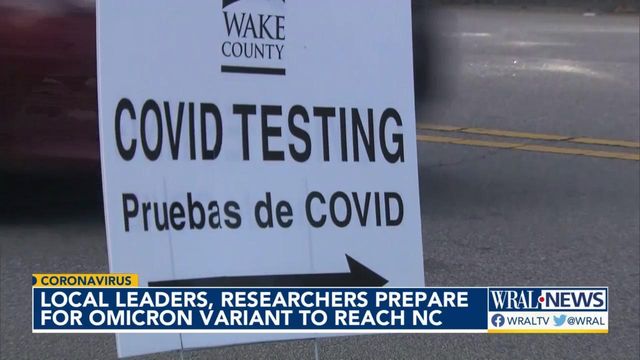No Omicron in NC; most samples still Delta variant of COVID-19
While the World Health Organization warned Monday that the global risk from the omicron variant is "very high" based on the early evidence, saying the mutated coronavirus could lead to surges with "severe consequences," no cases of that variant have been detected in North Carolina, according to the state Department of Health and Human Services.
Posted — UpdatedMore than 95% of coronavirus specimens sequenced in North Carolina are the delta variant, a spokesperson told WRAL News.
Gov. Roy Cooper will give an update on the COVID-19 response in the state on Tuesday. He is expected to echo the words of President Biden, who said Monday that existing vaccines are the best protection against this new threat.
Raleigh Mayor Mary-Ann Baldwin ackowledged COVID fatigue but said, "Now is not the time to let our guard down. We still ask everyone to wear a mask."
Health experts say it is just a matter of time before omicron variant cases are reported in the United States.
At UNC Health, all COVID cases are sequenced so that doctors and nurses know what variant of the virus they are dealing with.
”If Omicron infects any of our patients, it will be detected," said Alan Wolf, spokesman for UNC Health.
Dr. Lisa Pickett, chief medical officer at Duke University Hospital," said her colleagues would be ready.
"People have the PPE that they need, we have a flex plan for beds if people come in through the emergency room or from outside hospitals, and we know how to take care of those patients," she said.
On Monday a widening circle of countries around the world reported cases of the variant and moved to slam their doors in an act-now-ask-questions-later approach while scientists race to figure out just how dangerous the mutant version might be.
Japan announced it is barring entry to all foreign visitors, joining Israel in doing so. Morocco banned all incoming flights. Other countries, including the U.S. and members of the European Union, have moved to prohibit travelers arriving from southern Africa.
WHO said there are "considerable uncertainties” about the omicron variant. But it said preliminary evidence raises the possibility that the variant has mutations that could help it both evade an immune-system response and boost its ability to spread from one person to another.
“Depending on these characteristics, there could be future surges of COVID-19, which could have severe consequences, depending on a number of factors, including where surges may take place,” the WHO added. “The overall global risk ... is assessed as very high.”
The WHO stressed that while scientists are hunting evidence to better understand this variant, countries should accelerate vaccinations as quickly as possible.
While no deaths linked to omicron have been reported so far, little is known for certain about the variant, including whether it is more contagious, more likely to cause serious illness or more able to evade vaccines. Last week, a WHO advisory panel said it might be more likely to re-infect people who have already had a bout with COVID-19.
“Many of us might think we are done with COVID-19. It’s not done with us,” warned Tedros Adhanom Ghebreyesus, WHO's director-general.
Cases have been reported in such places as Canada, Germany, Britain, Belgium, Denmark, the Netherlands and Portugal, where authorities identified 13 omicron infections among members of the Belenenses professional soccer team.
The infections have underscored the difficulty in keeping the virus in check in a globalized world of jet travel and open borders. Yet many countries are trying to do just that, against the urging of the WHO, which noted that border closings often have limited effect and can wreak havoc on lives and livelihoods.
Some have argued that such restrictions can buy valuable time to analyze the new variant.
While the initial global response to COVID-19 was criticized as slow and haphazard, the reaction to the omicron variant came quickly.
“This time the world showed it is learning,” said EU Commission President Ursula von der Leyen, singling out South African President Cyril Ramaphosa for praise. “South Africa’s analytic work and transparency and sharing its results was indispensable in allowing a swift global response.”
The variant has provided further proof of what experts have long been saying: that no continent will be safe until the whole globe has been sufficiently vaccinated. The more the virus is allowed to spread, the more opportunities it has to mutate.
“The emergence of the omicron variant has fulfilled, in a precise way, the predictions of the scientists who warned that the elevated transmission of the virus in areas with limited access to vaccine would speed its evolution,” said Dr. Richard Hatchett, head of CEPI, one of the founders of the U.N.-backed global vaccine sharing initiative COVAX.
Related Topics
• Credits
Copyright 2024 by WRAL.com and the Associated Press. All rights reserved. This material may not be published, broadcast, rewritten or redistributed.





